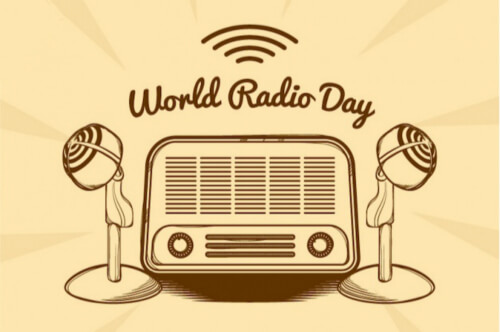
Message from Ms. Audrey Azoulay, Director-General of UNESCO, on the Occasion of World Radio Day文章源自英文巴士-https://www.en84.com/8755.html
教科文组织总干事奥德蕾·阿祖莱世界无线电日致辞文章源自英文巴士-https://www.en84.com/8755.html
文章源自英文巴士-https://www.en84.com/8755.html
13 February 2020文章源自英文巴士-https://www.en84.com/8755.html
2020年2月13日文章源自英文巴士-https://www.en84.com/8755.html
文章源自英文巴士-https://www.en84.com/8755.html
On this World Day, we celebrate the power of radio to reflect and promote diversity in all its forms.文章源自英文巴士-https://www.en84.com/8755.html
文章源自英文巴士-https://www.en84.com/8755.html
值此世界无线电日,让我们礼赞无线电广播在反映和促进各种形式多样性方面的力量。文章源自英文巴士-https://www.en84.com/8755.html
文章源自英文巴士-https://www.en84.com/8755.html
Everyone can feel at home in “voice land”, as Walter Benjamin called the radio in his writings for the radio. The diversity of broadcasting channels – AM, FM, long wave and, increasingly, digital radio, web radio and podcasts – is matched by the diversity of content and programmes produced, and the plurality of opinions, cultural expressions and sensitivities expressed.
在无线电广播这个被瓦尔特·本雅明大加称赞的“声音之乡”里,每个人都有宾至如归的感觉。无线电广播的渠道是多样的,有调幅、调频、长波以及越来越多的数字广播、网络广播和播客;其所制作的内容和节目,以及所表达的观点、情感和文化表现形式的丰富多元,也同样让人叹为观止。
Through the freedom it offers, radio is thus a unique means of promoting cultural diversity. This is particularly the case for indigenous peoples, for whom radio can be an accessible medium for sharing their experiences, promoting their cultures and expressing their ideas in their own languages. It is also the case with community radio stations, which relay the concerns of many social groups whose voices would have much less impact in public debate without radio. That is why UNESCO actively supports these radio stations and ensures, with all the means that its mandate confers on it, that they can develop.
无线电广播所提供的自由,使其成为促进文化多样性的独特手段。对土著人民而言尤其如此,对他们来说,广播电台是一个方便可及的媒介,他们可以用自己的语言来分享自己的经历、推广自己的文化并表达自己的想法。传递着许多社会群体各种关切的社区广播电台也发挥着同样的功能。假如没有广播电台,他们的声音就会在公共辩论中被淹没。因此,教科文组织大力支持这些广播电台,并在职能允许的范围内采取一切方法促进其蓬勃发展。
By inviting listeners to broaden their horizons, to discover new perspectives and to foster intercultural understanding, radio is a humanistic medium that helps to combat prejudice and discrimination.
广播电台邀请听众扩大视野、探索新的视角并促进跨文化理解,因而也是助力打击偏见和歧视、具有人文情怀的媒体。
This diversity must be seen in radio content, as well as among the creators of content – technicians, programmers, journalists, sound engineers, everyone has a role to play in this respect. In this context, it is important that the radio industry itself be an industry of diversity, reflecting the complexity and richness of our societies. Diversity is also an asset, as it is synonymous with more creativity and innovation in product content.
多样性不仅要体现在广播的内容中,也要体现在内容的创作者身上,包括技术人员、节目编排人员、记者、音响师在内,每个人在这方面都可以发挥作用。因此,无线电广播行业本身必须是多样性的行业,反映出我们社会的复杂性和丰富性。而多样性更是一种财富,它意味着所制作的内容在创造性和创新方面更胜一筹。
In this regard, UNESCO is paying particular attention to promoting greater participation by women in the radio industry. The Gender-Sensitive Indicators for Media thus help to measure the degree of awareness of gender equality in the media and the content produced, making it possible to assess in concrete terms the progress made – and that which still remains to be done – in giving more space to diversity.
此外,教科文组织也格外关注促进更多女性参与无线电广播行业。“媒体性别敏感指标”的纳入,有助于衡量媒体及其制作内容中性别平等意识的水平,从而可以具体评估在促进多样性方面所取得的进展以及尚需继续努力之处。
“Whenever we turn on the radio, the phenomena that ensue have a certain expression. The radio ‘talks to us’, even though we listen to no-one”. With these words, Theodor Adorno celebrated the magic of radio, the magic that we continue to sustain on World Radio Day.
“每当我们打开广播,接下来发生的现象颇有些意味深长。广播在‘跟我们说话’,即便我们没有在听谁。”西奥多·阿多诺的这番话道出了无线电广播的魔力所在。今年世界无线电日,让我们继续为这种魔力点赞助威。

